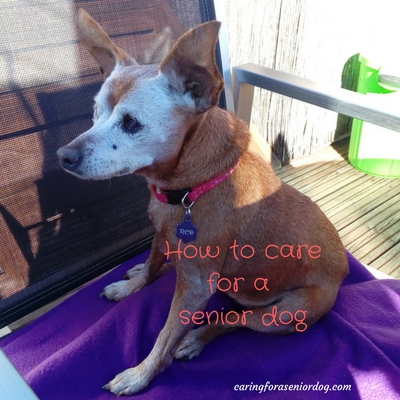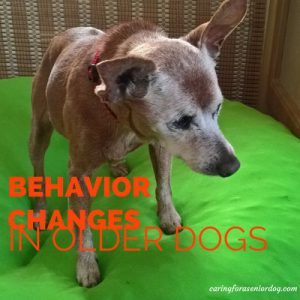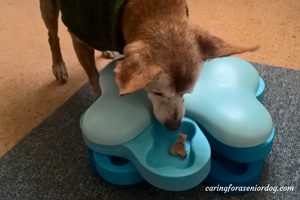
I can never write enough about how to care for a senior dog.
I hear about, and see too many people who, for some inexplicable reason, don’t seem to realise senior dogs need to be taken care of. Joints so painful their dog can’t walk should not be ignored because of their “my dog is old” attitude. Of course I find a nice way to explain, educate, hint…but as far as I know it always falls on deaf ears. Let’s  hope I’ve given them food for thought, and it wakes them up. It also makes me more determined than ever to keep banging away until this message can no longer be ignored!!
hope I’ve given them food for thought, and it wakes them up. It also makes me more determined than ever to keep banging away until this message can no longer be ignored!!
When I talk about how to care for a senior dog, yes I’m talking about the basics, but I’m also concerned about much more than that. I want every dog to have the best life they possibly can, so these tips will also cover enhancing the overall quality of that life.
One more thing I need to mention
There are plenty of “old” dogs (according to the calendar) who have way more energy than pups half or more their age. Most of these tips are for guardians of dogs of all ages, although some of them will be specific to old dogs who have slowed down.
My 13 helpful tips
Do not ignore changes in behaviour, no matter how subtle
Any change in behaviour, no matter how subtle, needs to be taken seriously. It could be anything from your dog refusing to eat a meal (which in my dog Red’s case is a very bad sign), to noticing your dog peeing more or even  howling or crying.
howling or crying.
We can often afford to wait when this happens in a young dog, but not so in an old one. Something small can turn nasty rather quickly, so it’s best to have your vet take a look.
When I notice anything “off” about Red, I book the next available appointment. I’d rather be a frequent visitor, than know I could have prevented my dog from suffering but chose to ignore the signs she was giving me.
I’ve often told my vet he should have a loyalty card like coffee shops do!
Read this ⇒ Behaviour Changes in Older Dogs
Nutrition
It’s never too late to start feeding your dog a healthy, nutritionally balanced diet. That seems to mean very different things to various pet parents, so it’s important to figure out what that means for you. I know people who  feed their dogs a name brand from the supermarket, those who prefer a raw diet, vets who swear by prescription diets and everything in between. Each one happy with their choices, and not looking to make a change.
feed their dogs a name brand from the supermarket, those who prefer a raw diet, vets who swear by prescription diets and everything in between. Each one happy with their choices, and not looking to make a change.
Where does that leave you? Researching and learning the options, which I’m telling you in advance, will confuse you with the amount of conflicting information. It’s about wading through, evaluating the source and deciding what makes sense.
In the nutrition section of this site (you will find the category on the right hand side of the page), I have a variety of articles to help get you started.
Read this ⇒ Should Every Old Dog Eat Senior Dog Food?
Supplements
You hear a lot about supplements such as fish oil, glucosamine and now bone broth for example, and the major differences pet parents have seen in their dogs. As with my recommendations about nutrition, I advise you to do some reading, and see what you think. Take that info to your trusted vet, or see a holistic vet for an alternative take on senior dog care.
Read this ⇒ Supplements For Dogs: A Whole Foods Approach
Healthy weight
Nothing sadder than seeing a fat old dog who can barely move, except seeing any dog who is so fat their back looks like a table. Using their age as an excuse is simply unacceptable. Sure they’ve slowed down a bit and aren’t  burning off their meals like they used to, but that’s not a reason.
burning off their meals like they used to, but that’s not a reason.
Cut down on the treats, particularly the unhealthy ones and think of making your own. There are many very simple recipes for nutritious snacks.
Speak to your vet about reducing the amount of food, or changing the type to help control the weight, and don’t forget the importance of physical exercise.
Read this ⇒ Obesity in Dogs
Physical exercise
Don’t be a person of extremes – my dog can’t hike so he stays inside. Ridiculous!! So he can’t run, but he can walk, even if it’s slowly. Rather than going out for 1 hour at a time, you may have to shorten each session but increase the frequency.
Swimming is great exercise as it’s easy on the joints, and something different (presumably) from the usual. Your town or city may have facilities for dogs when the weather gets colder.
He may not be able to chase other dogs like he used to, but he can play a game of tug…right?
Read this ⇒ Keep Your Dog Active Physically and Mentally
A social life
A social life doesn’t end when the date on the calendar says your dog is a senior. If he’s no longer able to handle the dog park, he’s missing his mates so why not arrange some play dates. It will give both of you the opportunity to socialise, and your dog will be in a controlled environment so he doesn’t get too over stimulated.
Don’t forget to include him in family outings like you used to. He may have slowed down a bit, but that is not a reason to leave him home alone. See the mobility aids section below for ideas to help make that happen.
Mental stimulation
A term many guardians are unfamiliar with, mental stimulation is as important as physical exercise in keeping your dog (from a puppy to a senior) fit and healthy. It’s important to find ways to keep their brain active, whether  that’s through the use of puzzles, treat dispensing toys or homemade games, do something every day to get your dog thinking and problem solving.
that’s through the use of puzzles, treat dispensing toys or homemade games, do something every day to get your dog thinking and problem solving.
Read this ⇒ The Importance of Mental Stimulation For Dogs
Personal/quiet space
Some dogs become a lot less tolerant as they age, and that intolerance can encompass a host of things, including noise and hustle and bustle. A quiet space with a crate (door left open) or one of his comfy beds will give him a cosy corner to escape to when things get too hectic.
Deal with pain and discomfort
Pain or discomfort are common causes of behaviour changes, and should be tended to right away. We are responsible for the care and wellbeing of our animals, and allowing them to suffer in any way is simply unacceptable.
Mobility aids
Mobility challenges should never be a reason for your dog to stop enjoying his life, and thanks to the number of mobility aids out there, he doesn’t have to.
If getting in and out of the car has been too difficult, and you are unable to lift him (or have had enough – perfectly understandable!!), a ramp is the answer. Ramps and pet stairs will also help him get on your bed (where else is he going to sleep?), onto the couch or a favourite chair. There are even ramps for boats!!
Other aids include pet strollers, slings for support, wheelchairs…
Read this ⇒ Mobility Aids For Dogs
Dental health
Often overlooked but critical to overall health, is proper dental care. Ignoring oral hygiene can lead to serious health issues, including organ damage. Signs of dental problems include:
- Drooling
- Pawing at the mouth
- Not eating/eating less/not as enthusiastic as usual
- Bad breath
Even if your dog is not exhibiting any of these signs, it’s worth a checkup anyway. Have your vet assess your dog’s oral health and make a dental care plan which includes:
- Brushing once a day (or as often during the week as you can)
- Water additives to reduce plaque
- Chew toys
- Bones
- Twice yearly checkups (recommended for seniors)
Read this ⇒ Dog Dental Care & Senior Dog Dental Care: It Could Save Your Dog’s Life
Vision or hearing loss
Vision and/or hearing loss are certainly not a given in every aging dog, but a possibility. If your dog seems to be ignoring you when called, is startled when petted, starts banging into things see your vet. A great tip I came across  recently is to use scent to help your dog find his way around. For example, if you tend to gather in the living room, an essential oil diffuser in there could help guide your dog to you.
recently is to use scent to help your dog find his way around. For example, if you tend to gather in the living room, an essential oil diffuser in there could help guide your dog to you.
Read this ⇒ Eye Problems in Dogs & Everything You Need to Know About Hearing Loss in Dogs
Be kind and patient
Of course you’re kind and patient, but you’re also human and the stress of caring for an ailing dog can come with frustration. Speak in a calm quiet voice and never shout…it’s not his fault.
Before I realised Red was suffering from dementia, things were incredibly stressful. It’s heart wrenching, and frustrating, watching your dog wander for hours, not settling, and not being able to do anything to help. Sometimes I would have to get out of the house just to take a break.
I realise it sounds like I let her wander and didn’t take her to the vet. Of course I did! I was there constantly. Diagnosis was a process of elimination as we were dealing with a few issues simultaneously.
How to care for a senior dog – conclusion
I find it incredibly sad how senior dogs are seen by many. They languish in shelters with little chance of adoption, yet I’m also encouraged when I see the number of rescues and groups devoted to finding loving foster or forever homes for our older companions. When I read of someone who has welcomed a senior into their home, especially a senior who is ill or with health challenges, it makes my soul soar.
While my mission is to help change the perception people have of old dogs, it is also to ensure everyone who is lucky enough to share their life with one has access to the best advice on how to care for a senior dog.
How do you care for your senior dog? Any tips or advice you can offer will help others, please share them in the comment section below, or on my Facebook page.

 Behavior Changes in Older Dogs
Behavior Changes in Older Dogs
I always enjoy your posts about senior dog care, as our dog Lucy is going on 17 years old. She is the first senior dog I’ve ever cared for, so I am learning every day. We’ve only had her for a little over a year – she was my parent’s dog, but their other dog started attacking Lucy, so they asked my husband and I if we could take her in so she could leave her golden years out in peace. We of course said yes. Anyway, it’s been a learning process, especially since she has pancreatitis. Since we’ve had her, we’ve changed her diet to something more nutritionally fulfilling, which helped her to gain weight (which she needed). Though she has some bad days when her pancreatitis flares up, she is usually very energetic and loves going out for walks and adventures. People comment that they can’t believe she is almost 17 years old. Thanks for all of these helpful tips! I definitely want Lucy to live a happy and healthy senior life!
Thanks that’s so kind of you to say. Lucky Lucy to end up in your loving home. I can imagine what a learning curve it’s been, thrown into the deep end as it were but you were amazing to take her in. I’ve had a couple of dogs with pancreatitis, Red being one of them but luckily only a couple of minor flare ups. Keeping a close eye on diet is so important. Lucy sounds like an amazing dog and it’s wonderful to be able to go out on adventures together.
Amazing tips again. I love reading your blog. You offer so many great ideas. As a dog trainer I am often called to the plate with change of behavior. However, when it truly is a out of the blue change, it really does point to something medical. Being proactive and frequent with our vet is key. Thanks for the post.
Thanks Tonya, so nice to hear. You raise a great point. A pet parent will call because of a change in behaviour, yet it’s so important to determine if it’s a training issue or a medical one.
I love this! Your tips are great, and you’re right, many of them apply to dogs of all ages. The 3 that I connect with most are:
Healthy Weight – soo sad to see fat dogs of any age, but especially seniors who really don’t need and can’t handle the extra weight on their aging bones and joints.
Physical exercise – should not be just for young, energetic dogs. Dogs of all ages love and need to exercise and it’s really easy to make an exercise routine that fits your dog’s needs.
and Mental stimulation… I can’t believe how many dog owners never even thing about keeping their dogs’ minds working! Great read, thanks!
Thanks Debbie, I’m glad you like the tips. A lot of what I write about is relevant for dogs of all ages and yes, this post as well. No matter what age a dog is, he needs to be at a healthy weight, plenty of physical exercise and mental stimulation to keep their brains active. I’m always amazed at how few people are familiar with the term “mental stimulation” never mind what it means for their dog.
This is great, it’s so comprehensive & Chock full of helpful tips and information! I have a soft spot for senior dogs. I have seen them passed over at the shelter many times. Some people worry that the dog is sick & they’ll have huge Vet bills. Some actually think with older dogs they’re not getting their adoption money’s worth. “He won’t live long enough, I’ll have to get another dog too soon” one callous individual actually said to me. But there are some wonderful people who seek out older dogs, I love those folks!
Love & biscuits,
Dogs Luv Us and We Luv Them
Thanks Cathy and I love hearing you have a soft spot for seniors. I know exactly what you mean about them being passed over at the shelter. I’ve witnessed it too many times, and looking back I don’t know how I didn’t give every one of those people a lecture. There are some kind and compassionate souls who look for the oldest or the longest tenant at the shelter, and those are the people I truly admire.
What a WONDERFUL article. I agree just because a dog is aging does not mean we should excuse changes in their behavior. I wish so much I could TALK to our Lyla and be sure we are doing ALL that we can to make her older years their best possible. Since we can not do this we have to be hyper aware of changes in her behavior and take her to the vet regularly.
You gave so many excellent tips and I love how you linked to even more information on each topic.
Thank you!
Thanks Joely. I’m sure you’re doing everything possible to make Lyla’s life as amazing as possible. You’re already doing the best things – keeping her happy and healthy, and taking her to the vet when you notice any changes in behaviour. It’s the best any of us can do.
It’s so hard first to admit our fur kids are “senior” as they’ll always be our kids but it is important to change our routine and care for them so they are with us for a long time. Great article and good reminder that I need to constantly assess the care we are giving our two 14-year old feline siblings.
It is hard to admit, and I’m happy to stay in my state of denial for as long as possible. You’re absolutely right about doing our best to care for them so they are with us as long as possible. Your kitties are doing well, happy to hear that.
Fantastic post, Hindy. My Husky “puppies” are all now seniors and these tips are right on. Most of these apply to us, with my one 12-year-young gal now deaf (very new) who also experienced a seizure, and also with my now furangel who had epilepsy and needed some extra TLC and a mobility aid. So very important to pick up on those signs. Sharing over on FiveSibes Facebook page & pinning on my “Bark About” board for my readers to see!
Thanks so much Dorothy, and thanks for sharing. I know where you’re coming from with issues that start creeping up, that’s why I watch Red like a hawk. If she could speak (she does in her own way but you know what I mean!!), I’m sure she’d tell me to stop fussing so much. The other day I noticed something was a bit “off” with her, from the moment she woke up. Although she never got worse, by the end of the day I knew I couldn’t wait for her next day’s appointment so my vet told me to come. I thought she has a stroke or something, it turned out to be inflammation on the brain. This is why I’m always banging on about signs.
I guess technically all three of my dogs qualify as seniors (10, 8, and 8), but so far none of them really have the health concerns of a senior dog. I appreciate these tips though because I know that dogs age way too quickly.
That’s great news Beth. It’s good to know not all senior dogs experience health issues – it’s definitely not a given, but watching out for changes in behaviour is so important, especially in older animals. They can go downhill quite quickly so catching something early gives them the best chance of beating it/managing it.
What great advice on taking care of senior dogs. Mom is already getting worried about me and Taffy, since she is over 8. So far we are very active and in good health but she is aware that she may need to start adjusting our food and supplements. Love Dolly
Thanks Dolly, I appreciate that. What can I say, we can’t help but worry about you furbabies. Glad to hear you’re staying active, that will keep you young but it’s probably a good idea to start looking into what can be done to keep you all in peak condition.
What an incredibly important post. Thank you so much for sharing such a comprehensive list of things pet owners should be mindful of when helping to care for their senior dog. You’re right, so many people don’t take on the responsibility of taking ownership of their older dog’s care by providing preventative care options/supplements, appropriate enrichment and medical care.
Thank you Bryn, I’m glad you think so. It really is surprising to me how neglectful people are of their senior pets. I don’t believe it’s intentional (not usually anyway), I think it’s an attitude they have towards seniors. Almost like whatever happens to them is a natural part of aging, what reason could they possibly have to take preventative measures or spend money on care. I hope attitudes start changing.
Thank you, as always, for the helpful advice on caring for senior dogs. I need to do more research on caring for senior cats. truffle and Brulee are still young, but their day will come.
So glad you found it helpful. It’s nice to have young cats with lots more years ahead of them to share life with, I admit I do miss having cats, something I plan on rectifying sooner rather than later. I fostered a 2 month old kitten recently, and I had forgotten about the jumping on the counter when you’re making dinner, walking across the stove, litter on the floor, digging tiny claws into my tender flesh…. never mind he was too adorable, especially when he curled up next to me to sleep. It was all worth it!!
Your tips for senior digs are so good, thank you, and.. Awareness awareness!
Thanks Mishu and yes, awareness is key.
Thank you so much for the great article once again! Really helpful i would like to appreciate your style. Thumbs Up.
Thanks.